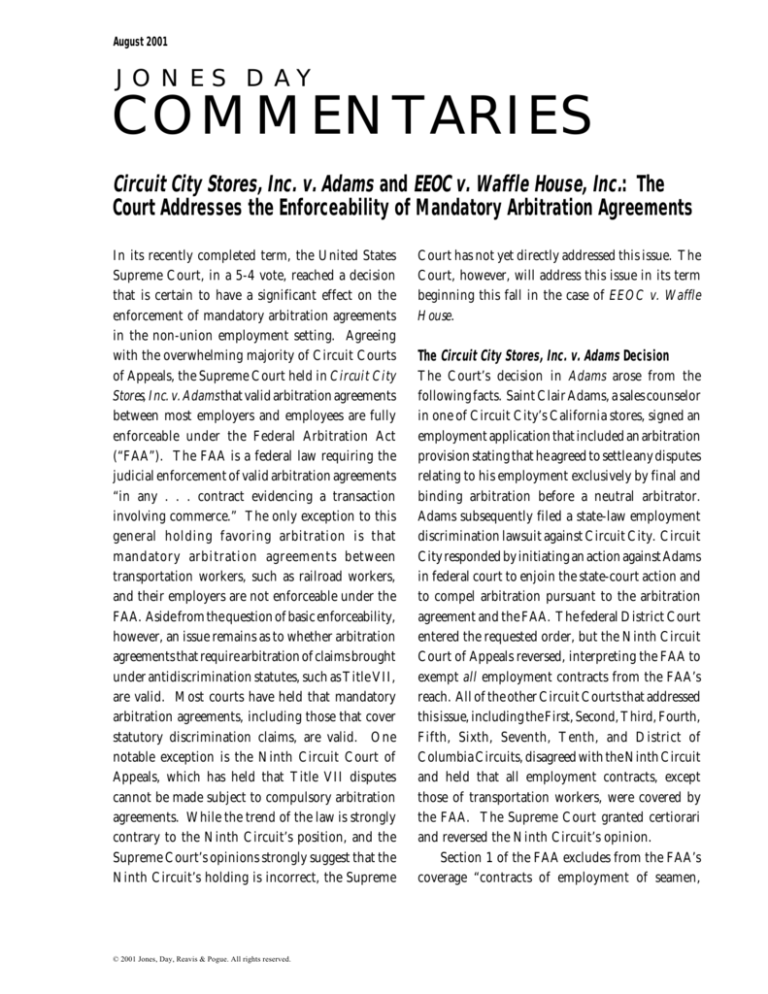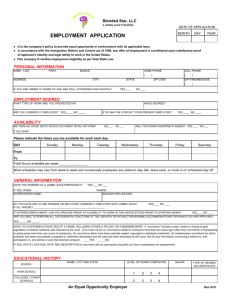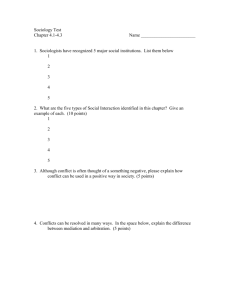
August 2001
JONES DAY
COMMENTARIES
Circuit City Stores, Inc. v. Adams and EEOC v. Waffle House, Inc.: The
Court Addresses the Enforceability of Mandatory Arbitration Agreements
In its recently completed term, the United States
Supreme Court, in a 5-4 vote, reached a decision
that is certain to have a significant effect on the
enforcement of mandatory arbitration agreements
in the non-union employment setting. Agreeing
with the overwhelming majority of Circuit Courts
of Appeals, the Supreme Court held in Circuit City
Stores, Inc. v. Adams that valid arbitration agreements
between most employers and employees are fully
enforceable under the Federal Arbitration Act
(“FAA”). The FAA is a federal law requiring the
judicial enforcement of valid arbitration agreements
“in any . . . contract evidencing a transaction
involving commerce.” The only exception to this
general holding favoring arbitration is that
mandatory arbitration agreements between
transportation workers, such as railroad workers,
and their employers are not enforceable under the
FAA. Aside from the question of basic enforceability,
however, an issue remains as to whether arbitration
agreements that require arbitration of claims brought
under antidiscrimination statutes, such as Title VII,
are valid. Most courts have held that mandatory
arbitration agreements, including those that cover
statutory discrimination claims, are valid. One
notable exception is the Ninth Circuit Court of
Appeals, which has held that Title VII disputes
cannot be made subject to compulsory arbitration
agreements. While the trend of the law is strongly
contrary to the Ninth Circuit’s position, and the
Supreme Court’s opinions strongly suggest that the
Ninth Circuit’s holding is incorrect, the Supreme
© 2001 Jones, Day, Reavis & Pogue. All rights reserved.
Court has not yet directly addressed this issue. The
Court, however, will address this issue in its term
beginning this fall in the case of EEOC v. Waffle
House.
The Circuit City Stores, Inc. v. Adams Decision
The Court’s decision in Adams arose from the
following facts. Saint Clair Adams, a sales counselor
in one of Circuit City’s California stores, signed an
employment application that included an arbitration
provision stating that he agreed to settle any disputes
relating to his employment exclusively by final and
binding arbitration before a neutral arbitrator.
Adams subsequently filed a state-law employment
discrimination lawsuit against Circuit City. Circuit
City responded by initiating an action against Adams
in federal court to enjoin the state-court action and
to compel arbitration pursuant to the arbitration
agreement and the FAA. The federal District Court
entered the requested order, but the Ninth Circuit
Court of Appeals reversed, interpreting the FAA to
exempt all employment contracts from the FAA’s
reach. All of the other Circuit Courts that addressed
this issue, including the First, Second, Third, Fourth,
Fifth, Sixth, Seventh, Tenth, and District of
Columbia Circuits, disagreed with the Ninth Circuit
and held that all employment contracts, except
those of transportation workers, were covered by
the FAA. The Supreme Court granted certiorari
and reversed the Ninth Circuit’s opinion.
Section 1 of the FAA excludes from the FAA’s
coverage “contracts of employment of seamen,
Finally, the Court found that a narrow reading
of Section 1 is appropriate considering the FAA’s
purpose of overcoming the historic hostility of certain
American courts to the enforcement of arbitration
agreements.
The Court concluded its opinion by addressing
an issue raised by 22 states that filed an amicus or
Friend to the Court brief in the case. The issue
raised by the states was how the Section 1 exemption
should be read. The states argued that the Court’s
previous application of this Section improperly
interferes with state employment laws that restrict
or limit the ability of employees and employers to
enter into arbitration agreements. The Court
responded by stating that this issue was decided in
the Court’s prior decision of Southland Corp. v.
Keating, in which the Court held that “Congress
intended the FAA to apply in state courts and to preempt state antiarbitration laws to the contrary.”
The Court reaffirmed the continuing vitality of
Southland and declined to revisit the issue. In doing
so, the Court acknowledged that “there are real
benefits to the enforcement of arbitration provisions”
and stated that the Court has “been clear in rejecting
the supposition that the advantages of the arbitration
process somehow disappear when transferred to the
employment context.”
railroad employees, or any other class of workers
engaged in foreign or interstate commerce.” In
reaching its decision, the Supreme Court had to
determine the scope of Section 1’s exemption,
namely, whether all employment contracts are
exempt from the FAA’s coverage or only the
employment contracts of transportation workers
engaged in “foreign or interstate commerce,” such
as seamen and railroad employees.
The Supreme Court concluded that Section 1
should be read narrowly to exempt only employment
contracts of transportation workers, “defined, for
instance, as those workers ‘actually engaged in the
movement of goods in interstate commerce.’” The
Court based its decision on several grounds.
First, the Court rejected the employee’s
argument that the FAA does not cover employment
contracts at all, and that the FAA only applies to
commercial contracts. The Court reasoned that
such a reading would make the exemption for certain
contracts of employment in Section 1 pointless.
Second, in addressing the specific language of
Section 1, the Court found that the phrase “any
other class of workers engaged in foreign or interstate
commerce” does not include all workers, but rather
only workers such as seamen and railroad employees
engaged in the foreign or interstate transportation
of goods. The Court declined to read the statute
more broadly to exempt all workers’ contracts
because such a reading would render Congress’
specific exemptions for “seamen” and “railroad
employees” superfluous.
Third, the Court found that Congress uses the
phrases “affecting commerce” or “involving
commerce” when it intends to exercise its authority
under the Commerce Clause to the fullest extent,
but it uses the term “engaged in commerce,” as it did
in Section 1 of the FAA, to indicate that it is not
seeking to exercise its Commerce power to the
fullest. Thus, Congress’ use of the phrase “engaged
in commerce” in Section 1 supports a narrow reading
of that provision.
Supreme Court Also Will Review the Effect of
Arbitration Agreements on EEOC Lawsuits
Shortly after deciding the Adams case, the Supreme
Court agreed to review the case of EEOC v. Waffle
House, Inc. In Waffle House, the Fourth Circuit
Court of Appeals addressed the effect of private
arbitration agreements on the EEOC’s ability to
enforce federal antidiscrimination laws by suing
employers on behalf of employees. Despite strong
objections from the EEOC, the Fourth Circuit held
that where an employee has signed an arbitration
agreement, the EEOC cannot sue the employer on
behalf of the employee for relief specific to the
employee, such as backpay, reinstatement, or money
2
For example, the agreement cannot contain
unconscionable terms or be entered into fraudulently
or under duress. In addition to satisfying state
contract principles, arbitration agreements are
required by courts to include certain due process or
fundamental fairness protections to ensure that
employees are given a fair opportunity to have their
claims heard. The particular protections that must
be included in an arbitration agreement vary by
jurisdiction, and some of them remain controversial.
Many arbitration experts agree, however, that the
following basic elements should be included in an
arbitration agreement between an employer and
employee to satisfy both state contract requirements
and fundamental fairness concerns:
• a neutral arbitrator;
• adequate discovery allowing employees to
present their claims fairly;
• no limit on statutory remedies;
• a written decision by the arbitrator;
• a fair limit on the cost to employees; and
• a mutual obligation to arbitrate — both
employer and employee must agree that they
will arbitrate their disputes.
In addition to the basic requirements listed
above, an employer should address the following
issues:
First, the employer should ensure that the
agreement is written in plain language and is
prominently presented to each person the employer
intends to be bound by the agreement. If the person
is a potential new hire, he or she can be required to
sign an arbitration agreement as part of the
application process. With regard to current
employees, state law may require that the arbitration
agreement be signed by the employee in order to be
enforceable. However, in other states, the employer
may institute mandatory arbitration by simply
distributing a written policy requiring arbitration
of disputes as a condition of continued employment
with the company.
damages. The Court also held, however, that the
EEOC can sue the employer for broad-based
injunctive relief, such as a permanent injunction
barring the employer from engaging in
discriminatory practices because such relief serves
the greater public interest. In reaching its decision,
the Fourth Circuit attempted to strike a fair balance
between the strong federal policy favoring
enforcement of arbitration agreements and the
EEOC’s right to sue employers in federal court to
“advance the public interest in preventing and
remedying employment discrimination.”
Three Circuit Courts of Appeals have addressed
this issue. The Fourth and Second Circuits agree
that the EEOC cannot seek employee-specific relief
in court if a private arbitration agreement exists,
while the Sixth Circuit has held that the EEOC may
pursue any type of relief, including employee-specific
relief, despite the existence of an arbitration
agreement. The Supreme Court is expected to
resolve the division among these Circuit Courts
sometime in the fall of 2001 or the spring of 2002.
In the meantime, the EEOC continues to challenge
the validity of mandatory arbitration of employees’
statutory discrimination claims.
The Decisions’ Practical Effect on Employers
The Supreme Court’s decision in Circuit City Stores,
Inc. v. Adams and the Fourth Circuit’s opinion in
EEOC v. Waffle House, Inc. both make clear that
valid arbitration agreements are effective tools for
employers that wish to arbitrate, rather than litigate,
workplace disputes. Thus, a wise employer will
ensure that its arbitration agreements are validly
written. The following section provides basic
guidelines for drafting valid and enforceable
arbitration agreements.
Basic Guidelines for Arbitration Agreements
To be valid, a mandatory arbitration agreement
needs to satisfy basic principles of state contract law.
3
Further Information
Second, if the agreement itself does not contain
the rules that will govern the arbitration — or
incorporate external rules, such as the American
Arbitration Association’s employment arbitration
rules — the employer should provide a copy of the
rules, plainly written, to each applicant and/or
employee. The agreement should acknowledge
receipt by the employee of these rules.
Third, the agreement should clearly set forth
the scope of disputes subject to arbitration. The
most comprehensive coverage would include every
dispute between the employee and the employer,
any companies affiliated with the employer, any
other employee of the employer, and the employer’s
officers, agents, or successors that involve or relate
to the individual’s application, employment, or
termination of employment. The agreement also
should make clear that it covers every employmentrelated dispute including, but not limited to, all
state common law contract or tort claims and all
state and federal statutory discrimination claims.
Fourth, if an employer wants to preclude the
arbitration of class actions or the consolidation of
numerous individuals’ claims, the rules should
expressly prohibit class actions and consolidated
claims.
Fifth, it is usually advisable to exclude workers’
compensation and unemployment insurance claims
from arbitration, as typically required by state law,
and many experts believe that claims under the
National Labor Relations Act should also be
excluded. Finally, the agreement should state that
it is not intended to supersede a grievance procedure
contained in an ERISA-covered benefit plan.
There are many other provisions that may be
appropriate for a particular employer to include.
For example, arbitration agreements can designate
the location of arbitration hearings, the number of
arbitrators, whether provisional remedies such as
injunctions are available, whether the parties have a
right to legal representation, and the scope of judicial
review, if any.
This Jones Day Commentaries is a publication of
Jones, Day, Reavis & Pogue and should not be
construed as legal advice on any specific facts or
circumstances. The contents are intended for general
informational purposes only and may not be quoted
or referred to in any other publication or proceeding
without the prior written consent of the Firm, to be
given or withheld at its discretion. The mailing of
this publication is not intended to create, and receipt
of it does not constitute, an attorney-client
relationship.
Employers are urged to contact any of the Jones
Day attorneys listed below or their regular contact
attorney at Jones Day for assistance in formulating
appropriate arbitration agreements for their
respective companies. General e-mail messages may
be sent via the Internet to counsel@jonesday.com.
We invite you to visit our Web site at
www.jonesday.com.
Atlanta
Chicago
Cleveland
Columbus
Dallas
Los Angeles
Pittsburgh
Washington
4
Deborah Sudbury
404-581-8443
Dan T. Carter
404-581-8019
Elaine Rogers Walsh 404-581-8371
Irene Savanis
312-269-4155
Lawrence C. DiNardo312-269-4281
Steven T. Catlett
312-269-4306
Brian Easley
312-269-4320
James A. Rydzel
216-586-7227
Barbara J. Leukart
216-586-7190
G. Roger King
614-469-3874
Matthew W. Lampe 614-469-3863
Colleen A. Deep
614-469-3879
Todd L. Sarver
614-469-3835
Lori A. Clary
614-469-3616
Kimberly J. Potter
614-469-3951
Stanley Weiner
214-969-4866
Katie J. Colopy
214-969-5298
Patricia Seifert
214-969-4883
William J. Emanuel 213-243-2429
Allison R. Michael
213-243-2475
Harry I. Johnson III 213-243-2347
Richard F. Shaw
412-394-7962
Amy E. Dias
412-394-7915
Willis J. Goldsmith 202-879-3920
Andrew M. Kramer 202-879-4660
Alison B. Marshall
202-879-7611









